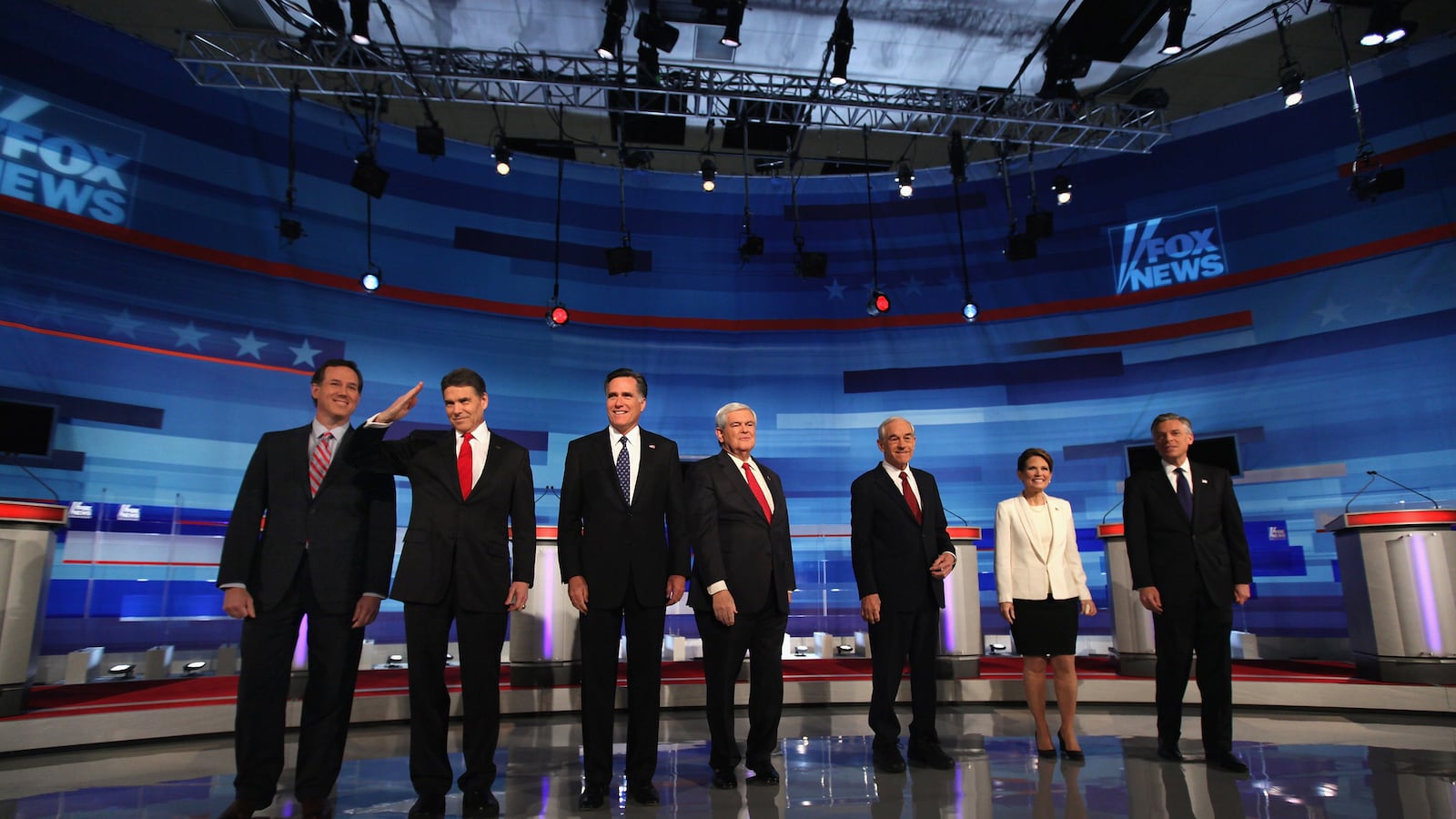Howard Kurtz defends the glamorous style of presidential debates in a rebuttal to Stuart Stevens. In his own way, he also defends the idea of having 27 debates in a presidential primary nomination, 18 of which were held before the first voters cast an actual ballot. (Emphasis mine).
The reason there were so many Republican debates last year—and more than 20 involving Barack Obama and Hillary Clinton in the previous cycle—is that the candidates kept saying yes. And whose fault is that?
The top contenders don’t want to appear to be ducking. And the also-rans need a way to break through. Indeed, without the debates, it’s hard to imagine Newt Gingrich or Herman Cain having been able to rise to the top of the polls, or the underfunded Rick Santorum having been able to hang on as long as he did.
Debates even the playing field, even as they attract their share of unelectable oddballs.
Fault can be assigned fairly easily.
The GOP field from 2012 can be fairly neatly divided into three camps: serious candidates, attention seekers, and cranks. The latter two would accept any and all debate invitations. The debates held the rough imprimatur of the Republican Party, and each candidate on stage would by default appear a candidate for President of the United States.
Serious candidates would then be exceedingly foolish to decline such an event. This is a classic example of the prisoner's dilemma: were all the serious candidates to agree to a limited number of debates, all could feel safe to skip the extraneous events. But as that agreement will never happen, all candidates feel compelled to attend all debates.
Kurtz also neatly answers another of his own arguments: that the battle over debates is really another example of campaigns and journalists fighting for control:
It’s not the media’s fault that Romney said during one debate that illegal immigrants should “self-deport” or offered to make Rick Perry a $10,000 bet. By the same token, he cleaned President Obama’s clock in the first general-election debate. A strong candidate knows how to hit major-league pitching.
I'll indulge the sports metaphor: having 18 debates before the first actual vote is like asking a pitcher to throw 300 pitches while warming up in the bullpen. At a certain point, all you're doing is wearing down your arm.
And after, let's say, four or five debates, a voter will have all the information he or she needs to make an informed choice. The Michele Bachmann screeds about stealth jihad, the Ron Paul demands for a gold standard and Newt's rambling about Newt-things quickly reach the point of no longer being helpful to the democratic process.
Journalists, particularly those who cover horserace politics and how the media covers horserace politics, love having so many debates. It's a big show, the actors put on cute outfits and think of witty things to say, and everyone has their moment in the spotlight.
But we don't hold debates because they play well for POLITICO. The purpose of a debate is to allow candidates to display how they think on their feet, allow them a chance to directly engage each other in a civil fashion, and (a holdover from the pre-radio and TV era) to get everyone in the same room and let an audience judge for themselves.
Today's candidates can engage each other in all sorts of ways, and we certainly don't need a telegenic TV moderator to sit there while candidates spew talking points at each other. In that sense, we really no longer need debates at all. But from a purely incrementalist perspective, can't we just agree to stop adding even more debates to the calendar?
A few final thoughts: was there a single moment from the primary debates that added something substantive to the presidential race? Did we really learn how any of the candidates handled themselves under pressure? Were conservative ideas vigorously debated, with differing viewpoints well-represented? Were conservative voters offered a variety of options that gave them a hand in shaping the future of the Republican Party? Did the debates strengthen the GOP? Did they strengthen the general election?
My answer on all counts: no.
So I'll go beyond Stuart Stevens. It's not just an issue of having debates gussied up and put on prime-time. It's an issue of too many debates in general.
Fewer debates in a less sexy setting with a smaller number of invited candidates.
That's what strengthens the GOP primary process, and by extension, offers the American people better presidential candidates.
My apologies in advance to the networks, horserace politics people and pundits, but it's really not about you. High ratings does not a strong political process make.





